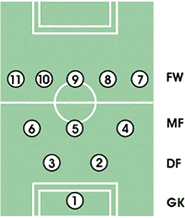| Formation | 1863~1925 Pyramid System (2-3-5) |
 |
When the Football
Association (FA) came into being and set the unified code of rules in 1863, any player in
front of the ball on the attacking side was deemed offside, and thus, dribbling was the
predominant offensive tactic while remaining behind the ball. Several years later, the
rules were changed to allow a player to be onside if there were three or more members of
the opposing team closer to the opponents' goal line than he was. This rule change allowed passing to become an offensive tactic, and consequently, the team formation (the position of the players) called the "pyramid" system evolved. The system's name came from its trianglular shape with the forwards forming the bottom side of the triangle facing the opposing team. Expressed in modern terms, it was a 2-3-5 system. The defense was "zonal," which meant that each of the two defenders marked any attacking player coming into the zone that they were responsible for. Because of the offside law in those days, two defenders provided security. Even if one of them failed to set an in offside "trap," there was still one other defender besides the goalkeeper. (According to the present rules, a player is onside unless there is only one player, who may be the keeper, in front of him when he is passed the ball.) |